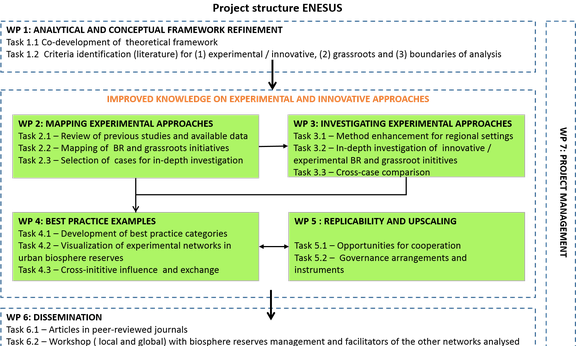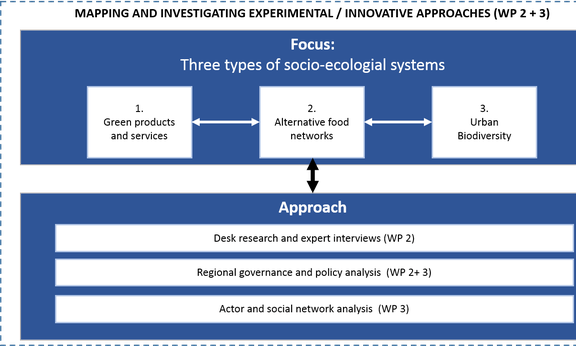Working Group Development Studies and Sustainability Science (AGEF)
Experimental networks for sustainability: Urban Biosphere Reserves as engines of transformation (ENESUS)
Global change processes like climate change and issues of globalization pose severe challenges for all societies and spatial levels and require fundamental changes in how societal needs are fulfilled (sustainability transitions). Different societal systems like e.g. food or industrial products and services are at the heart of the debate about how to address these challenges and how to achieve global goals. However, these systems are often rooted in persistent “unsustainable” trajectories. Consequently, experimentation has become a major topic in the sustainability debate and in regional development alike. Urban areas are hereby of twofold importance. First, they are triggers of local to global environmental problems e.g. due to their high use of resources. On the other hand, different forms of capital, exchange and innovative approaches are concentrated here.
Urban Biosphere Reserves can be understood as a concept that seeks to establish suitable circumstances for experimentation and innovative approaches. They act as model regions, “real world laboratories” or “future labs”. Nevertheless, Urban Biosphere Reserves are not the only forms for this. There are many approaches for local problem solutions out there today performed e.g. by grassroots movements like Transition Towns. These network spaces of experimentation by now focus on local initiatives, the strengthening of the capacity to act and resilience. Even though Urban Biosphere Reserves initiatives are quite similar in these aspects, the background and structures differ widely. Their goals and understanding of what is sustainable and what not can be completely diverse. The degree of urgency of persistent problems requires an acceleration of these small initiatives, that is to say an increase in the speed of change, the scale of change and/or increasing connections of different sectors. The alignment of grassroots and Urban Biosphere Reserve initiatives with increased cooperation between them seems to be a promising strategy to achieve this. However, there is little knowledge and understanding about their capacities for experimentation, adaptation, cooperation and upscaling. This understanding is crucial to induce wider processes of change where the civil society (e.g. activists), social networks (like Biosphere Reserves or Transition owns) and researchers cooperate with each other.
ENESUS is a transdisciplinary research project to better understand the conditions for experimentation by exploring, analysing and comparing (network) initiatives in order to improve the role of Urban Biosphere Reserves as engines of sustainability transitions. With this, synergies, cooperation and learning processes between activities that share a common direction are fostered in order to accelerate transitions towards sustainability within the World Network of Biosphere Reserves. The project consortium uses a case study approach of Urban Biosphere Reserve initiatives and grassroots movements that happen in the same areas (Brighton and Lewes Downs (UK), La Palma (Esp), São Paulo Green Belt (Bra), Wienerwald (AT)). We want to
- improve knowledge on experimental and innovative approaches in the thematic focus areas of new green businesses and products, alternative food networks and urban biodiversity, within Urban Biosphere Reserves including their multi-scale and -actor causes and effects
- analyse and compare successful network governance models for learning and exchange between experimental approaches within or with the Urban Biosphere Reserves and
- establish co-learning strategies for replicability and upscaling within the World Network of Biosphere Reserves e.g. establishment of a transdisciplinary research group on innovation in Urban Biosphere Reserves
Researcher from the Universities of Innsbruck, Vienna and São Paulo use a stepwise approach were the necessary tasks are divided into seven work packages. The 24 months long project contains six milestones including local and global workshops with different stakeholder, activists and researchers. The empirical part is based on mixed methods research with qualitative and quantitative data and methods like social network analysis or storytelling. Project management and coordination are essential in this project. It is needed to build up good communication, to establish an analytical approach fitting for the different case study areas and to bundle up the experiences in order to extract the best results.
Project key data
Duration: 09.15.2017 - 09.15.2019
Team:
- Martin Coy
- Armin Kratzer
- Ute Ammering
- Tobias Töpfer
Partner:
- University of Vienna
- Universidade de São Paulo
Funding:
- Österreichische Akademie der Wissenschaften (ÖAW), MAB (Man and Biosphere)
Projectdatabase: metadata
News archive
3rd of May 2019: Transdisciplinary Workshop on initiatives for socio-ecological transitions in Sao Paulo (03.05.2019)
The ENESUS project team Sao Paulo invited initiatives for socio-ecological transitions in the Sao Paulo green belt biosphere reserve for a workshop: "Transição para a Sustentabilidade na Reserva da Biosfera no Cinturão Verde da Cidade de São Paulo: O Papel dos Agentes de Inovação Socioambiental". The workshop has been life-streamed and contents are summarized by graphical recordings. (Download graphical recording one, two)
First Fieldwork in La Palma (26.06.2018)
The fieldwork in our case study La Palma has started. For impressions of our project partner Max Mannheim (Univ. of Vienna) and his Netmapping see the facebook post of the La Palma Biosphere
Case studies map online (26.01.2018)
A map showing case studies of ENESUS has been added to the project pages (click here to see it)










